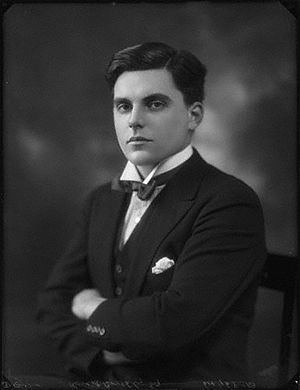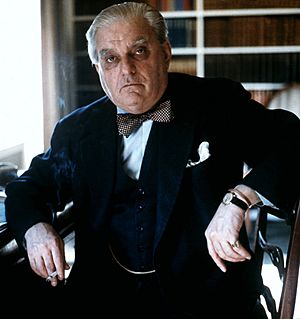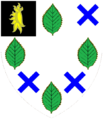Robert Boothby, Baron Boothby facts for kids
Quick facts for kids
The Lord Boothby
|
|
|---|---|

Boothby in 1924
|
|
| Parliamentary Secretary to the Ministry of Food | |
| In office 15 May 1940 – 22 October 1940 |
|
| Monarch | George VI |
| Prime Minister | Winston Churchill |
| Preceded by | Alan Lennox-Boyd |
| Succeeded by | Gwilym Lloyd George |
| Member of the House of Lords Lord Temporal |
|
| In office 18 August 1958 – 16 July 1986 Life Peerage |
|
| Member of Parliament | |
| In office 29 October 1924 – 18 August 1958 |
|
| Preceded by | Frederick Martin |
| Succeeded by | Patrick Wolrige-Gordon |
| Constituency | Aberdeen and Kincardine East (1924–1950) East Aberdeenshire (1950–1958) |
| Personal details | |
| Born | 12 February 1900 Edinburgh, Scotland |
| Died | 16 July 1986 (aged 86) London, England |
| Political party | Conservative |
| Spouses |
Diana Cavendish
(m. 1935; div. 1937)Wanda Sanna
(m. 1967) |
| Parents | Robert Tuite Boothby Mabel Lancaster |
| Alma mater | Eton College Magdalen College, Oxford |
Robert John Graham Boothby, Baron Boothby (12 February 1900 – 16 July 1986), also known as Bob Boothby, was an important British politician. He was a member of the Conservative Party.
Contents
Early Life and Education
Robert Boothby was born in Edinburgh, Scotland. He was the only son of Sir Robert Tuite Boothby. He went to St Aubyns School and then to Eton College. Later, he studied History at Magdalen College, Oxford.
During the end of the First World War, he trained to be an officer. He joined the Brigade of Guards. However, he was too young to fight in the war. After finishing university in 1921, he became a partner in a company that dealt with stocks.
Political Career

Robert Boothby first tried to become a Member of Parliament (MP) in 1923. He was not successful then. But in 1924, he was elected as an MP for Aberdeen and Kincardine East. He held this seat until 1950. After that, he was elected for the new area called East Aberdeenshire. He was re-elected in 1955.
In 1958, he left his seat as an MP. He was given a special title called a "peerage". This meant he became a member of the House of Lords. He was known as Baron Boothby.
Working with Winston Churchill
From 1926 to 1929, Boothby worked closely with Winston Churchill. Churchill was the Chancellor of the Exchequer at the time. Boothby was his Parliamentary Private Secretary. This was an important role.
In 1940, during the Second World War, Boothby became a junior minister. He worked for the Ministry of Food. He later left this job. During the war, he also joined the Royal Air Force Volunteer Reserve. He worked with Bomber Command and later with the Free French Forces. He was given the Legion of Honour award in 1950 for his work.
Views on the Economy and Europe
Boothby often spoke about his ideas for the economy. He believed the government should plan more for the country. He did not agree with some ideas about free trade for food. He thought it would harm British farmers.
He was also a British representative to the Council of Europe from 1949 to 1957. He strongly believed that the United Kingdom should join the European Economic Community. This group later became the European Union.
Other Roles and Recognition
Boothby was a well-known person on radio and television. He often appeared on the BBC radio show Any Questions. He also liked to talk about how good herring fish was to eat!
He held many important positions. He was Vice-Chairman of the Committee on Economic Affairs. He was also the Rector of the University of St Andrews from 1958 to 1961. He led the Royal Philharmonic Orchestra for a few years. He received an honorary degree from St Andrews in 1959. He was also made an honorary citizen of several towns. In 1953, he was made a Knight Commander of the Order of the British Empire (KBE).
There is a blue plaque on his house in Eaton Square, London. This plaque shows that a famous person lived there. He was also featured on the TV show This Is Your Life in 1963.
Meeting with Hitler
Boothby visited Germany often before the Second World War. In 1932, he was invited to meet Adolf Hitler. Boothby later wrote about this meeting. He said he saw "the unmistakable glint of madness in his eyes." This meeting helped him decide to support Winston Churchill. Churchill was trying to get Britain to prepare for war more quickly.
Later Life and Death
Robert Boothby passed away in London on 16 July 1986. He was 86 years old. His ashes were scattered at Rattray Head in Aberdeenshire. This was near the area he used to represent as an MP.
Publications
Boothby wrote several books about his life and ideas:
- The New Economy, 1943
- I Fight to Live, 1947
- My Yesterday, Your Tomorrow, 1962
- Boothby: recollections of a rebel, 1978
Images for kids
 | Bayard Rustin |
 | Jeannette Carter |
 | Jeremiah A. Brown |



